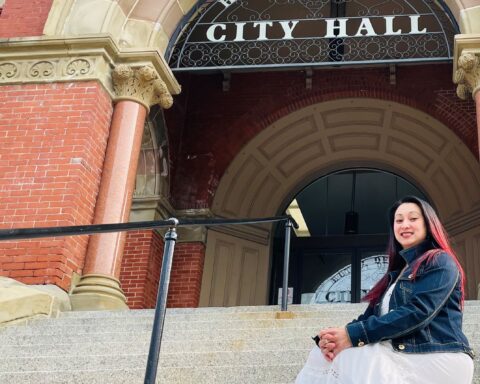Lucile Davier, currently a post-doctoral fellow at the University of Ottawa, has spent many years looking at journalism that relies on translating from a foreign language. In a sense, her work examines the implications of reporters and editors working in multilingual settings. She has authored two studies, both of which looked at journalism in Switzerland, including stories leading up to the 2009 minaret ban in the central European nation.
New Canadian Media interviewed Davier by e-mail to better understand her findings and any lessons Canada can learn given its own multilingual-multicultural context.
Questions relating to The paradoxical invisibility of translation in the highly multilingual context of news agencies (2014)
1. Your study focused on two news agencies Agence France-Presse (AFP) and Agence télégraphique suisse (ATS) in Switzerland. Why did you choose these two news agencies?
I wanted to investigate multilingual news agencies based in Switzerland and their coverage of a Swiss political event. The Swiss bureaus of Associated Press (since 2009) and Reuters only produce news in English. This leaves us with two multilingual players: the global Agence France-Presse (AFP), which has a regional bureau in Geneva and produces information in French and English, and the national Agence télégraphique suisse (ats), which covers Switzerland in German, French and Italian, the three official languages of the country.
2. What would you say were your three main findings from this study?
To start with, I think it is important to clarify that these wire agencies are B2B services: they sell their stories to other media outlets, large companies and governmental offices. In other words, their stories are circulated very widely in the media.
First, I confirmed that translation is everywhere in news agencies: editorial meetings are multilingual, reporters deal with sources in a second language every day, most quotations are translated, etc.
Second, I showed that translation is hidden: it is never mentioned as such neither in the stories nor in the newsroom, and it is considered by the staff as simple and straightforward.
This combination of high multilingualism and invisibility of translation may distort the information. When they are not sure they have understood a source correctly, journalists (especially young ones) are afraid of asking colleagues because translation is supposed to be so easy. Moreover, their stories are not subjected to bilingual revision, so inaccurate translations can go past unnoticed. Eventually, journalists avoid sources in a second language as much as possible in order not to have to deal with translation.
3. What do you think are the implications from your findings? What do journalists who work in multilingual contexts need to know about translations in their reporting/editing? Is there something like “lost[to readers] in translation”?
There are important implications for the training of journalists in Switzerland, and possibly in other multilingual countries (I am currently conducting a similar study in Canada). I believe that the language proficiency of journalists should be enhanced during their education. Their translation skills should be developed as well: I am a translator myself, so I can tell that mastering a second language is not a sufficient condition to be able to translate.
I would like to help audiences read news from multilingual media or in a multilingual country with a critical eye. There is a loss in every translation, even good translations, because information gets lost, added and changed when it crosses linguistic and cultural barriers. If you read online news, try to be critical: for example, did the President of China speak in English? Or was his speech translated? By whom? By the Chinese government? By a news agency?
Questions relating to ‘Cultural translation’ in news agencies? A plea to broaden the definition of translation (2015)
1. This study examined the role of culture in news translation, in the specific context of a debate in Switzerland (2007-10) over banning the building of Islamic minarets. What do you think were the 3 main findings?
Reporting about a foreign event for a local audience means crossing two borders: a language border and a cultural border. This study specifically looked at cultural borders. Given the time and space constraints newswire reporters face, these changes can be spotted in three textual phenomena.
The most common place for cultural information is background paragraphs. Background paragraphs are mostly situated at the end of a story and give general information about a region or a happening. My study showed that these paragraphs influence the way the readers understand the story. For instance, a paragraph saying that Muslims in Switzerland are “mainly from the Balkans and Turkey” may convey the idea for the readers that Muslims are foreigners.
Journalists also need to categorize sources for readers who are not familiar with them, for example to explain if a political party is left-wing or right-wing. In the case of foreign news in particular, these categorizations cannot include very detailed information and guide the reader towards a biased interpretation.
While reporting about a foreign event, journalists come to grips with culture-specific terms. They can either borrow a foreign reality and explain it (e.g., “the Federal Council – or Swiss government”), or substitute it with a word referring to a known reality (e.g., “the Cabinet”). Replacing a foreign notion altogether with a familiar concept may be easier to understand for the readers, but it also unfairly makes them believe that the notion is similar to what they know. For instance, using the word “referendum” in French refers to a rare political event in Canada and France. In Switzerland, however, a “votation” is a form of referendum but is organized at least four times a year, which is typical of a semi-direct democracy.
2. Do you think the debate over the minarets would have been different had reporters accounted for cultural factors in their reporting/translation of interviews?
This was not covered in the article under discussion, but is the subject of a broader research which will be reported in a book coming out this April. It will discuss how the representations journalists have of translation influence the choice of their sources. To cut a long story short, journalists have negative conceptions of translation: they find it dull and tedious, so they try to avoid it whenever they can. As a result, they unconsciously favour sources able to speak their native language.
For instance, French-speaking reporters quoted a disproportionate number of French-speaking Muslim representatives, who traditionally hold more radical views of Islam than their German-speaking counterparts. Had they translated more, they would have given a voice to more moderate visions of Islam in the country. Who knows, it may have made Swiss voters more empathetic towards the Muslim population.
3. What do you think are the implications of this study for journalists working in multicultural contexts like Canada?
Cultural explanations may look more important than “linguistic” translation, but I believe both phenomena are just two sides of the same medal. My study showed that news agency journalists tend to copy and paste the same explanations about an event from one news item to the next one, which can reinforce cultural prejudices. However, if reporters integrate new background information from time to time (let’s be realistic…) by translating it from other stories (from other language communities or regions), they may introduce new points of view and widen the mindsets of their audiences.
Readers could also learn to be more critical about the concise background information they are given in a news report. When you come across cultural explanations, you can try to figure out what information was included or left out given the time and space limitations the journalists need to work with. Could this explanation be a caricature of a more complex reality? Where could you find more detailed background information?
Lucile Davier is a post-doctoral fellow at the University of Ottawa and a lecturer at the University of Geneva (Switzerland). In 2013, she earned a joint doctoral degree in translation studies and communication studies from the University of Geneva and the University Sorbonne Nouvelle (France). During the academic year 2012-2013, she was a visiting scholar at the University of Leuven (Belgium). Her research interests include news translation, convergent journalism and ethnography of translation/journalism. She has also freelanced as a professional translator (language combination: FR-DE-EN-ES) since 2006. Davier can be reached at LDavier@uottawa.ca




